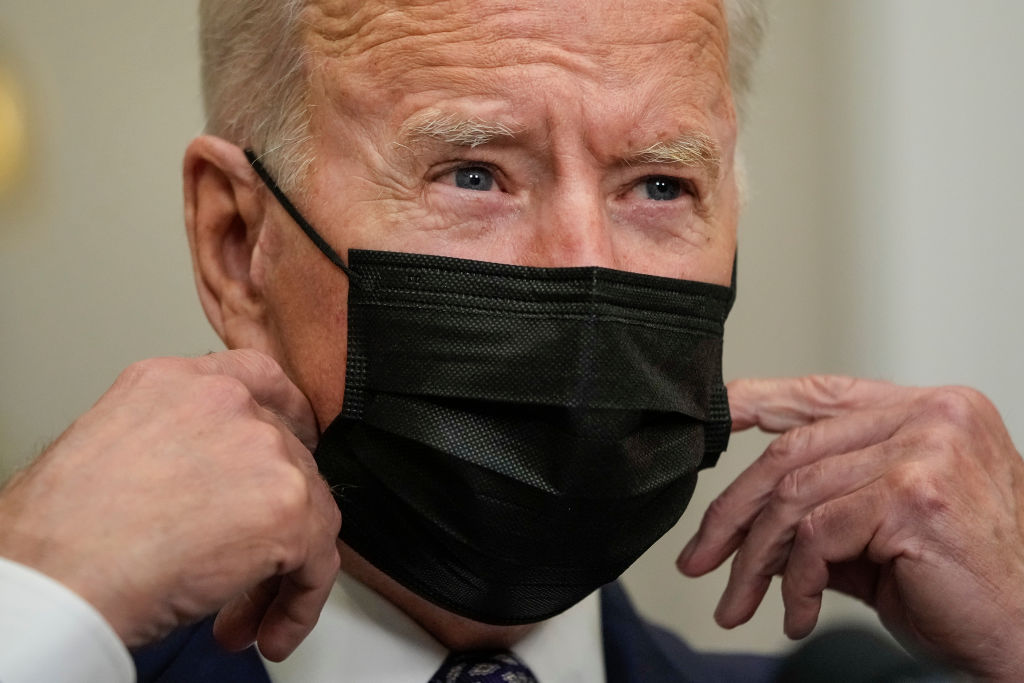Biden needs to learn to live with the virus
The writer Matthew Walther caused something of a stir yesterday with a piece in the Atlantic about attitudes towards the coronavirus in the rural corner of Michigan he calls home. “Outside the world inhabited by the professional and managerial classes in major metropolitan areas,” he writes, “many if not most, Americans are leading their lives as if Covid is over, and they have been for a long while.”
Anyone who doesn’t live in or near a big, blue city — or any city-dwellers brave enough to don their safari jackets and venture out into rural America — will recognize Walther’s description. And he is right about the parochialism of strict adherence to CDC guidelines and the soul-crushing neuroses that have settled in as the new normal among the Covid cautious. There’s also a big gap between what liberal America says and what it does: living reasonably normal lives, but doing so quietly because proudly ripping off the mask and getting on with things is for the hoi polloi.
And yet, for all the undeniable class, partisan and geographic divides that mean different parts of America have lived through very different pandemics, it’s important not to overstate the notion that, beyond elites in big cities, no one cares about the virus anymore. Take recent polling by Ipsos, which found that a majority (52 percent) of Americans believe returning to their pre-coronavirus lives right now is a large or moderate risk. One in three Americans do not expect to return to their pre-Covid life until more than a year from now. A further 15 percent say they will never be able to return to their normal lives. Omicron, these numbers suggest, has snuffed out much pandemic optimism.
This pessimism poses a political dilemma for the president. Six months ago, Joe Biden declared victory over the pandemic. The promise of “normalcy” he was elected on was, in large part, a promise to put Covid in the rear-view mirror. The problem for Biden isn’t just that with more than a thousand Americans dying a day, the pandemic is, by his own definition, very much not over. It’s also that the way in which he framed the coronavirus — as a crisis that would come to a definitive end once the right people were in charge — has been disproven by the trajectory of the virus.
Everyone agrees that Covid is on its way to being endemic, and that a zero-Covid future is not possible. No one worth listening to denies that normalcy means living with the virus, rather than comprehensively defeating it. And yet the White House’s messaging has not changed to reflect this obvious reality.
For nearly two years, Democratic policymakers have been recklessly relaxed about the costs of pandemic restrictions, waving away the consequences of closed schools, social isolation and shut businesses. If (or, rather, when) the Omicron wave hits, a cocktail of exasperated voters and overzealous public health officials will put Democrats in a very difficult position. Patience over school closures, for example, long ago ran out even among the Covid hawks in deep-blue parts of the country.
Biden has settled into a scolding tone on the pandemic, tut-tutting the unvaccinated, shifting the blame and offering little in the way of leadership. He must do better. He could concede that “victory” over the virus will ultimately mean getting on with our lives. He could acknowledge that in many cases Covid restrictions don’t pass a basic cost-benefit analysis. Perhaps most importantly, he could offer the American people some optimism and demonstrate a can-do determination not to let the virus derail our lives. Doing these things would be good for the country and good for his own political prospects.
*** Sign up to receive the DC Diary in your inbox every weekday ***
Forced-labor bill gets the green light
A deal has finally been reached on legislation to block goods made with forced labor in Xinjiang. The House and Senate had passed different bills, but a compromise brokered by Jim McGovern, a Democratic congressman, and the Republican Senator Marco Rubio means that the law will be on the books soon.
The Dispatch reports that under the new laws, all goods made in Xinjiang will be presumed to be at least in part produced by forced labor. But the laws also give businesses the chance to be exempted from the ban if they can demonstrate “clear and convincing evidence” that their supply chains are slavery-free. The legislation, versions of which have had the support of both the House and the Senate for months, had been on ice until Rubio stalled must-pass military funding legislation over the issue.
The bill is set to pass in spite of a ferocious lobbying campaign by the likes of Nike and Apple to have the anti-slavery measures watered down.
Amtrak derails its vaccine mandate
The president’s beloved Amtrak is no fan of vaccine mandates. The rail service said that the train-loving commander in chief’s stipulations would have meant scaled back services. Ninety-seven percent of Amtrak employees have either received at least one dose of the vaccine or are exempted.
Amtrak CEO William J. Flynn said that a federal court decision halting the enforcement of the executive order for federal contractors “caused the company to reevaluate our policy and to address the uncertainty about the federal requirements that apply to Amtrak.”
Buy a year’s subscription to The Spectator World as a gift for a friend or loved one here
What you should be reading today
Jacob Heilbrunn: Liz Cheney’s high noon
Slavoj Zizek: Why Julian Assange is such an unpopular cause
Stephen L. Miller: What Chris Wallace does next
Andrew Michta, Wall Street Journal: Russia and China’s dangerous decline
Elizabeth Economy, Foreign Affairs: Xi Jinping’s new world order
Scott McConnell, the American Conservative: Is wokeness almost over?
Poll watch
President Biden Job Approval
Approve: 42.9 percent
Disapprove: 50.4 percent
Net approval: -7.5 (RCP Average)
Should Biden run for re-election?
Yes: 34 percent
No: 58 percent (Morning Consult)


















